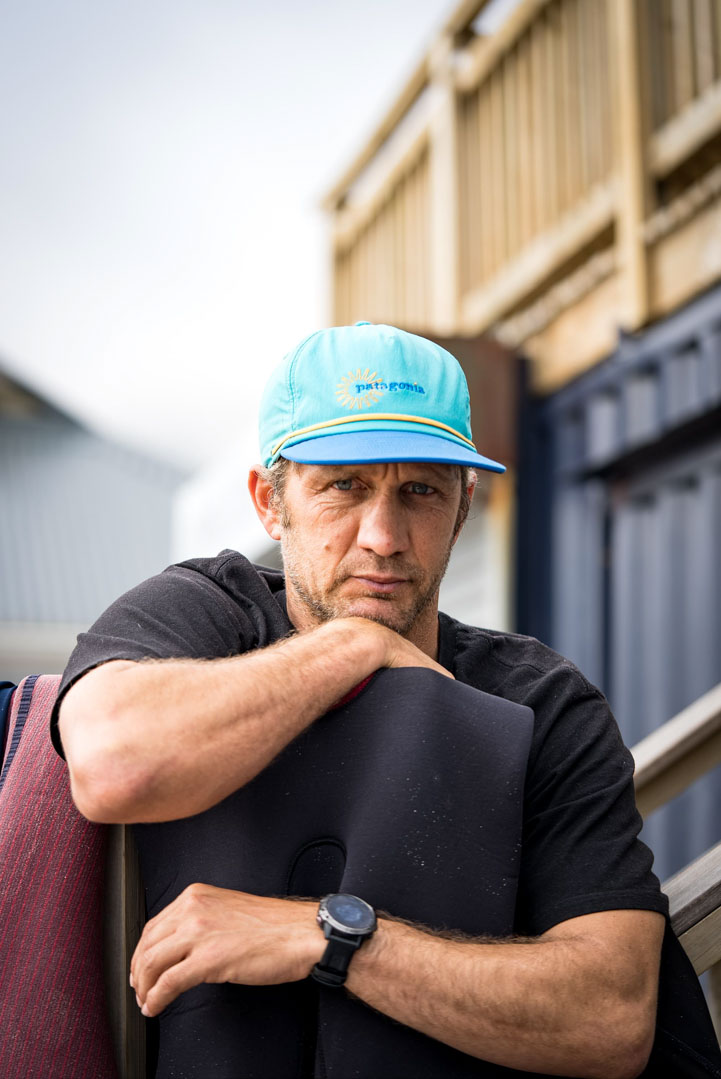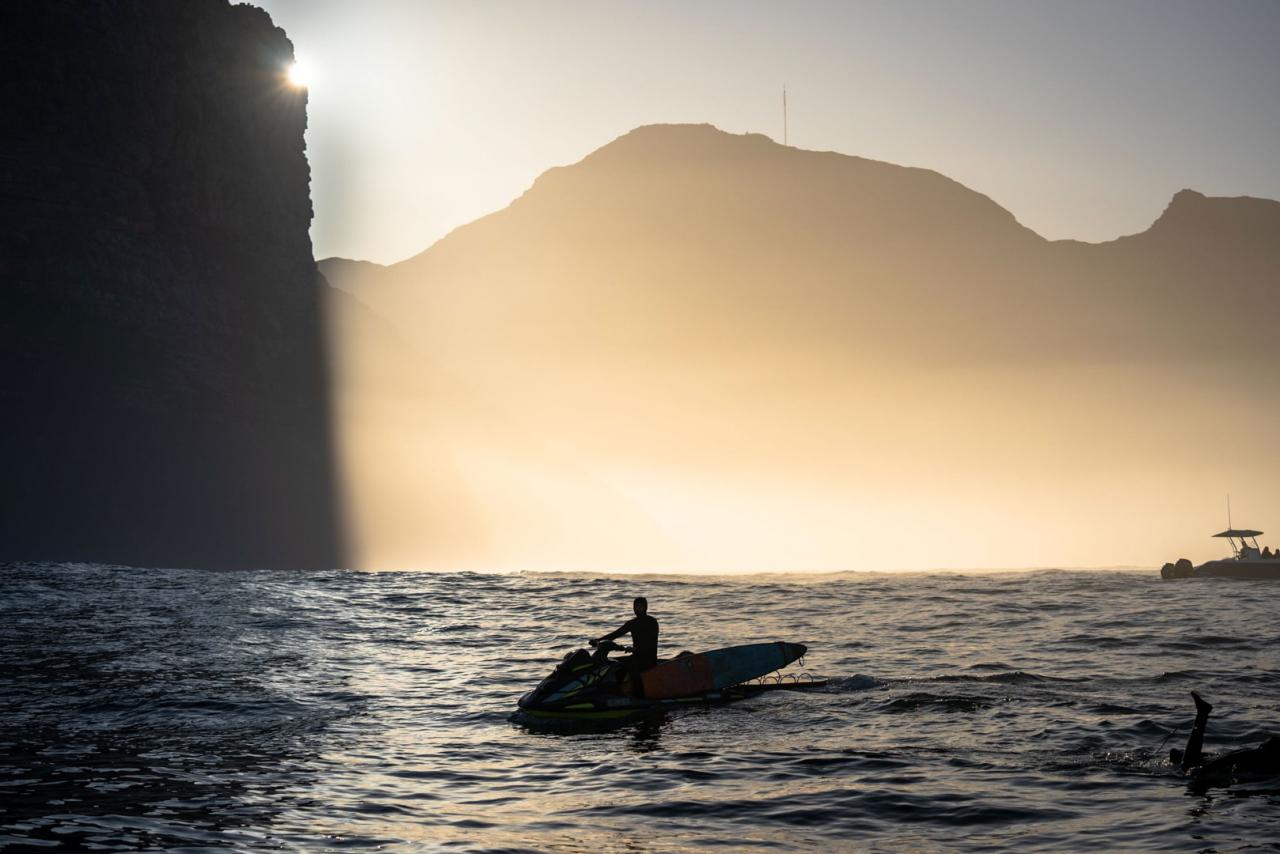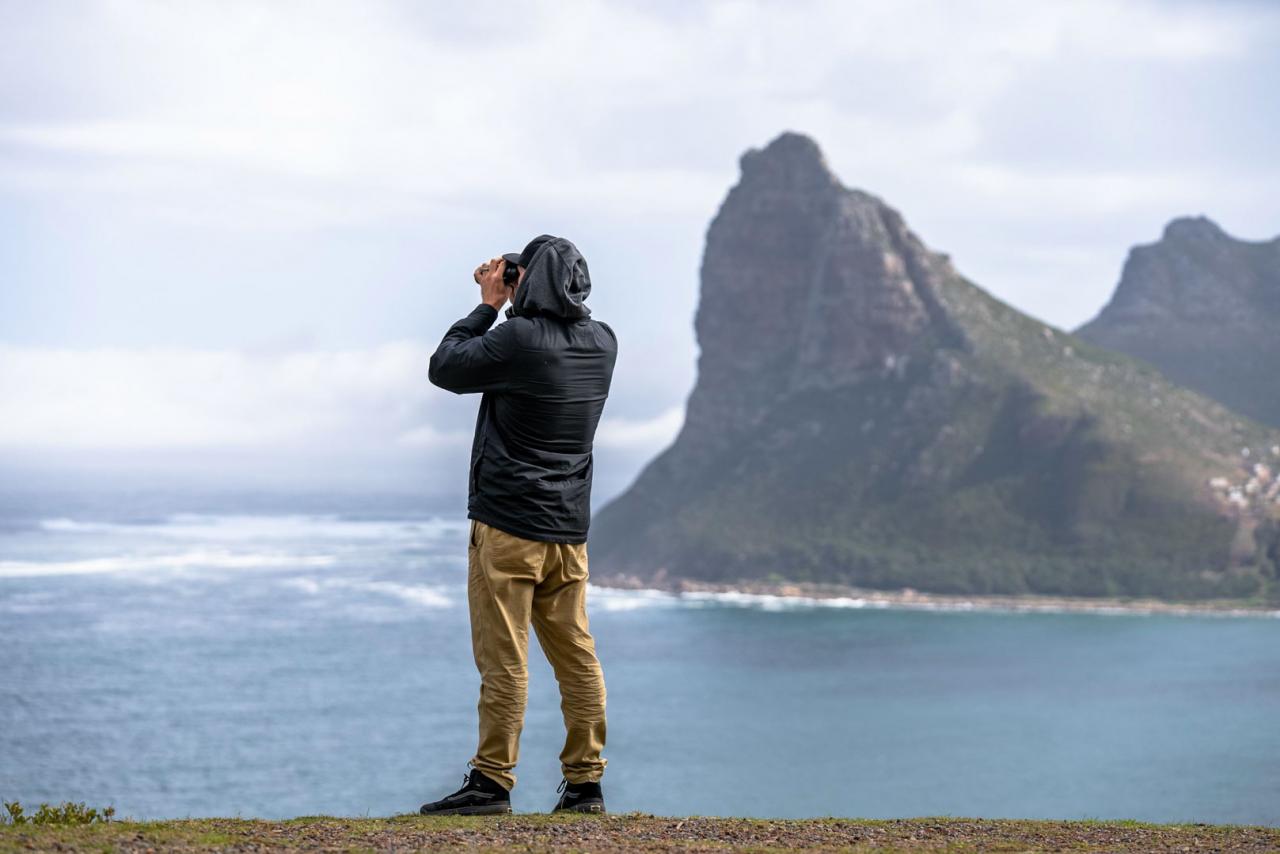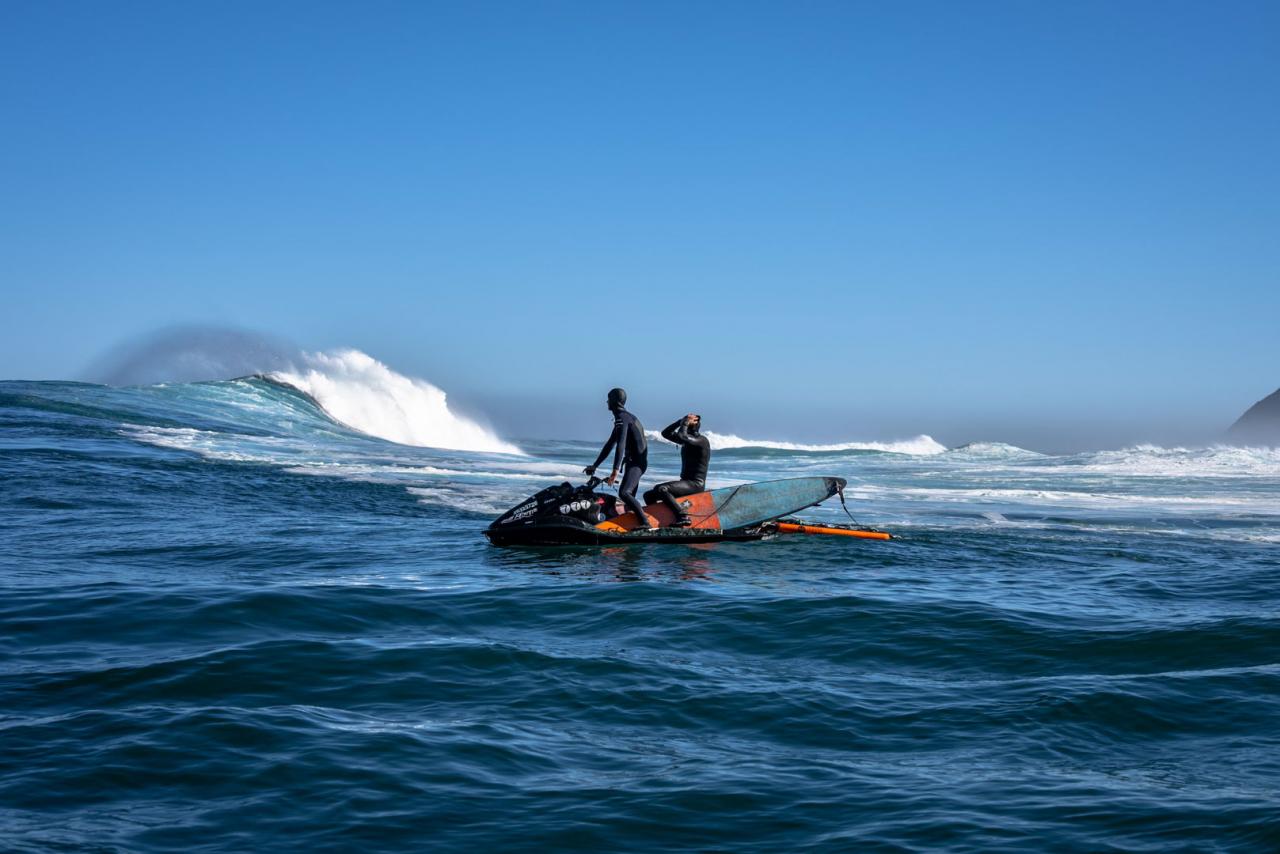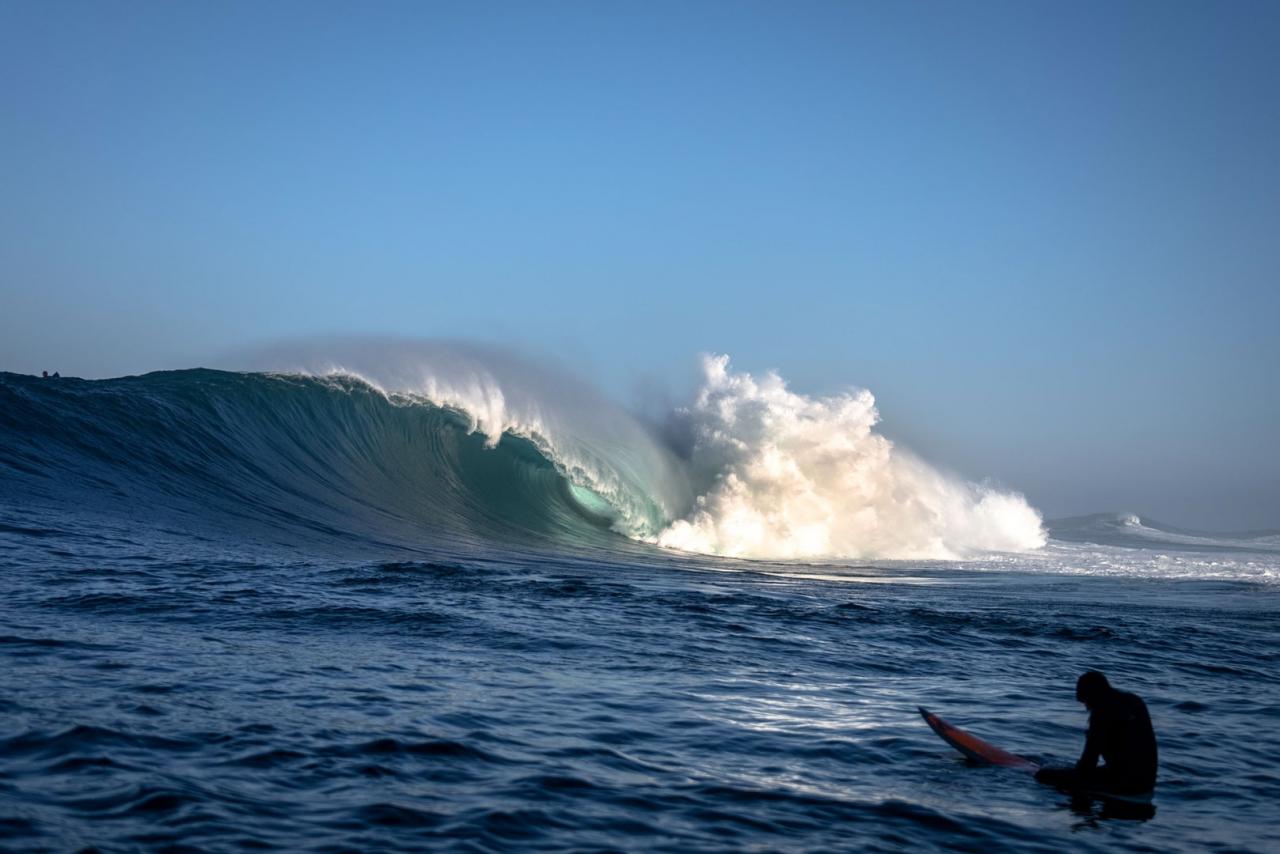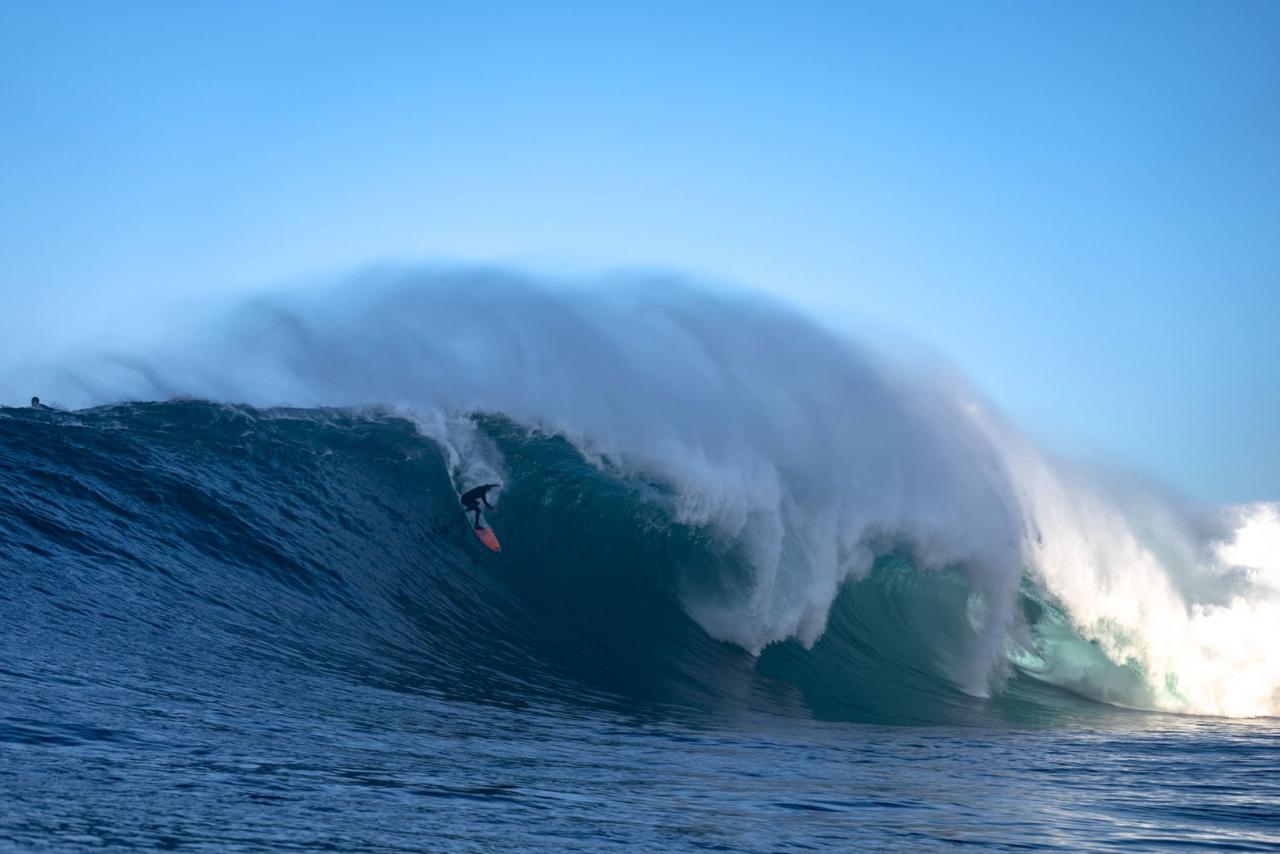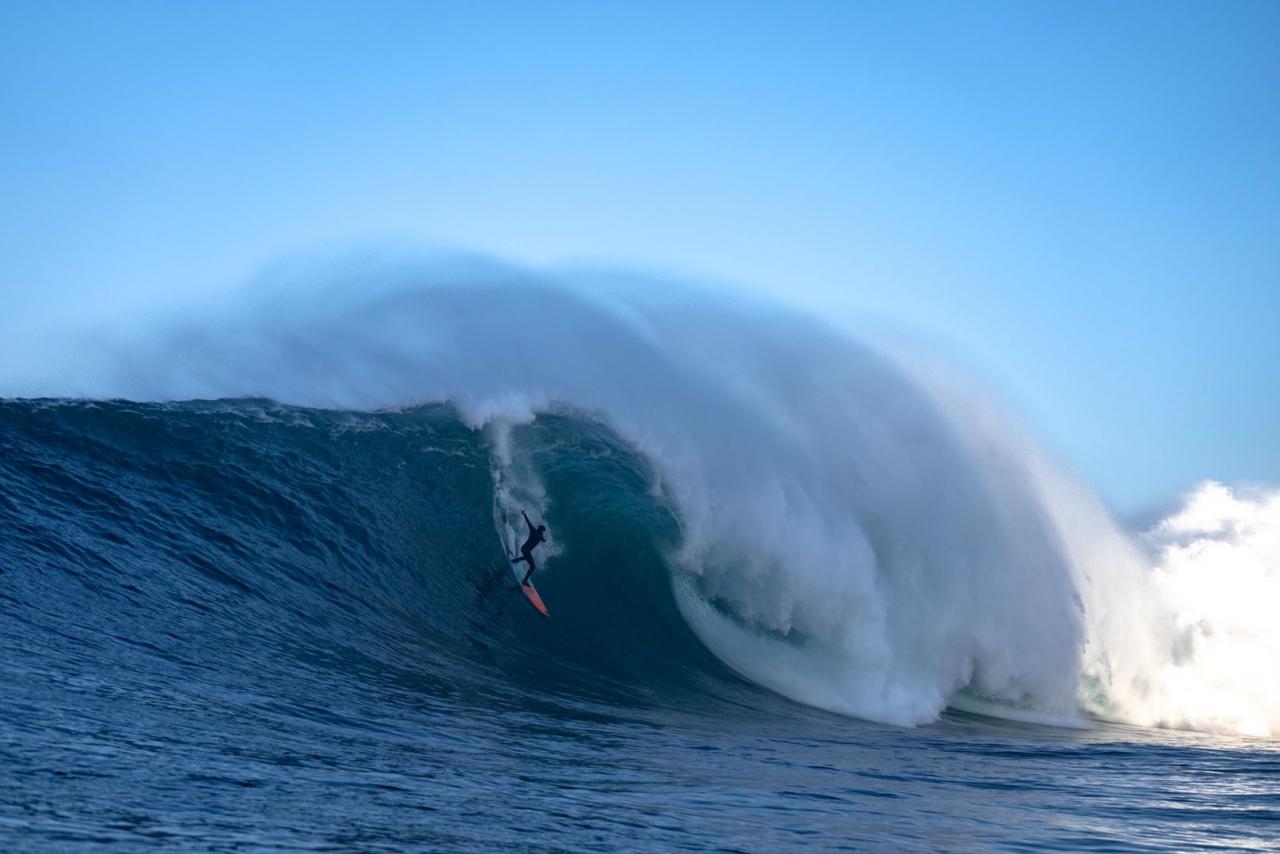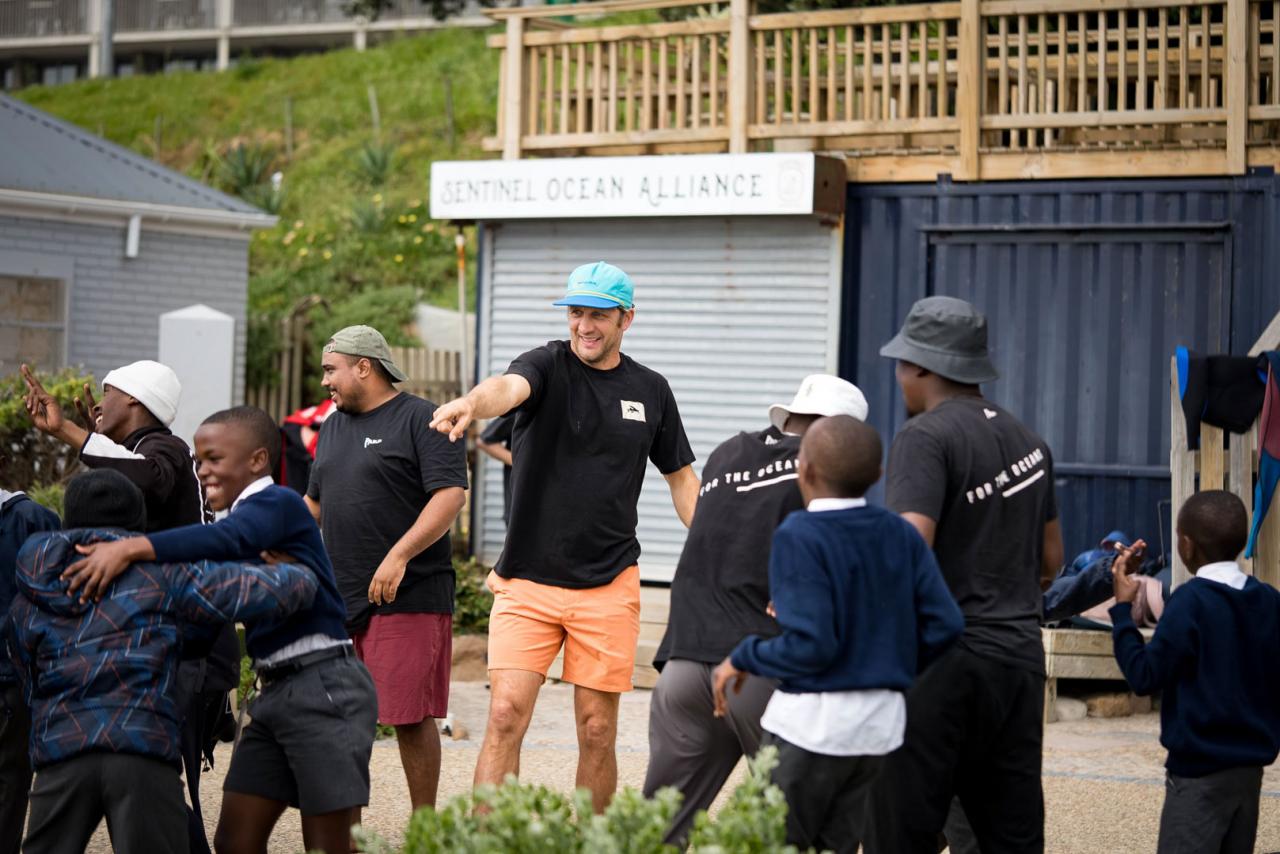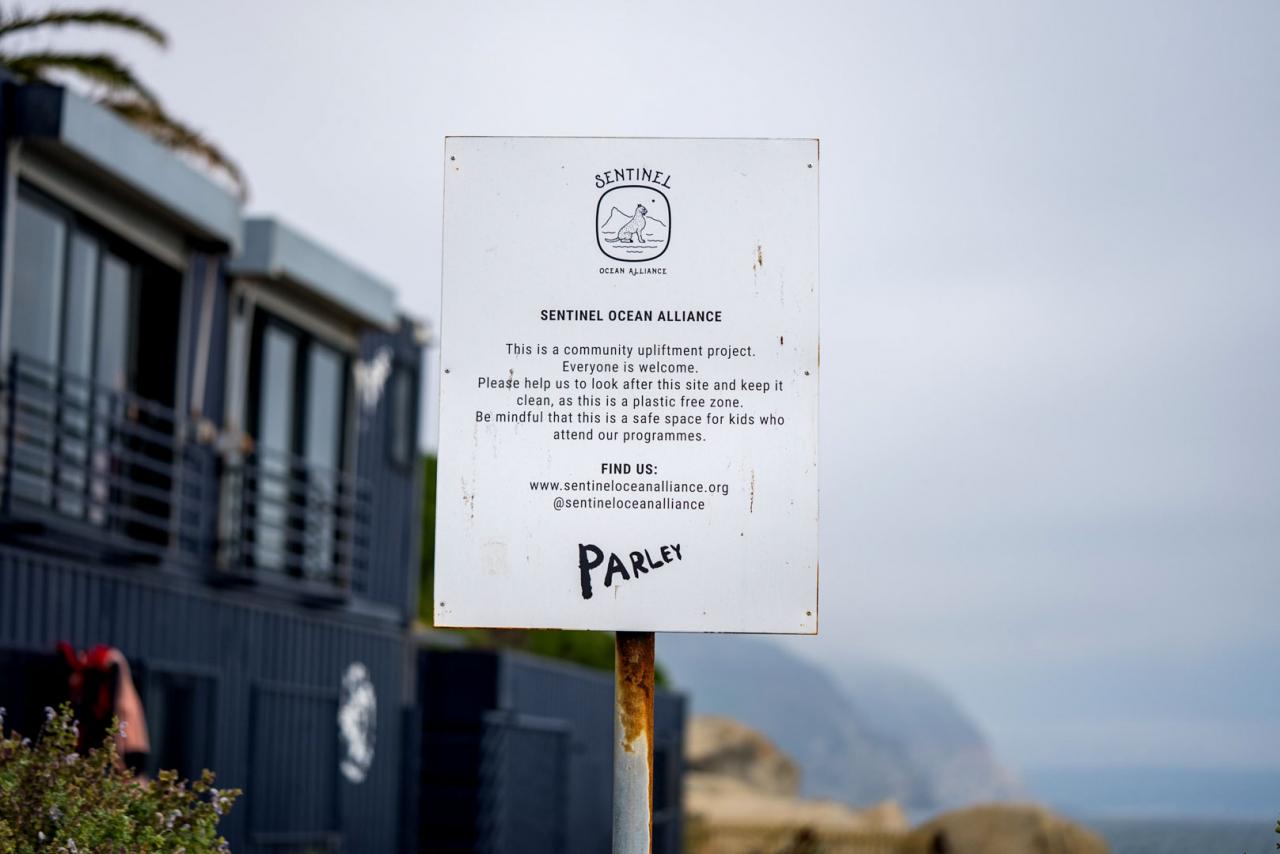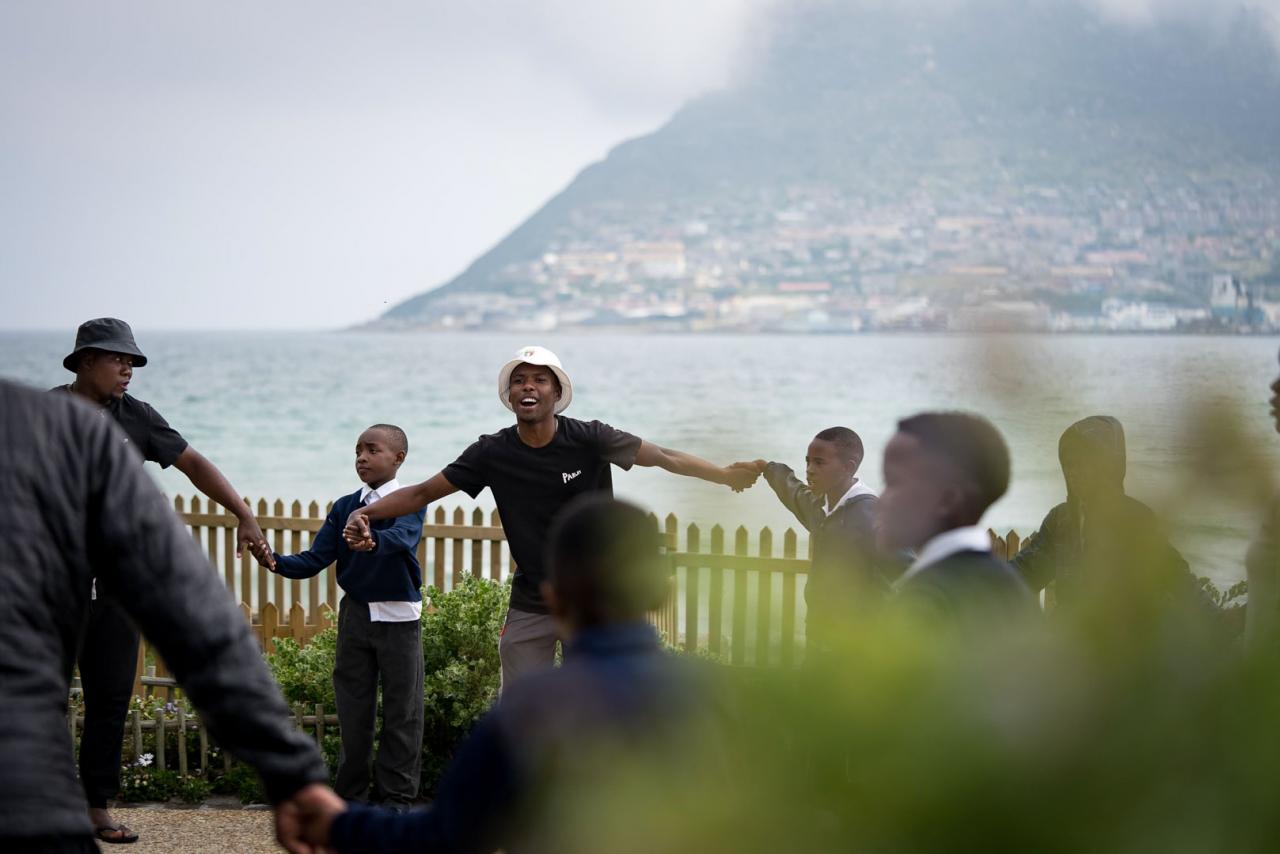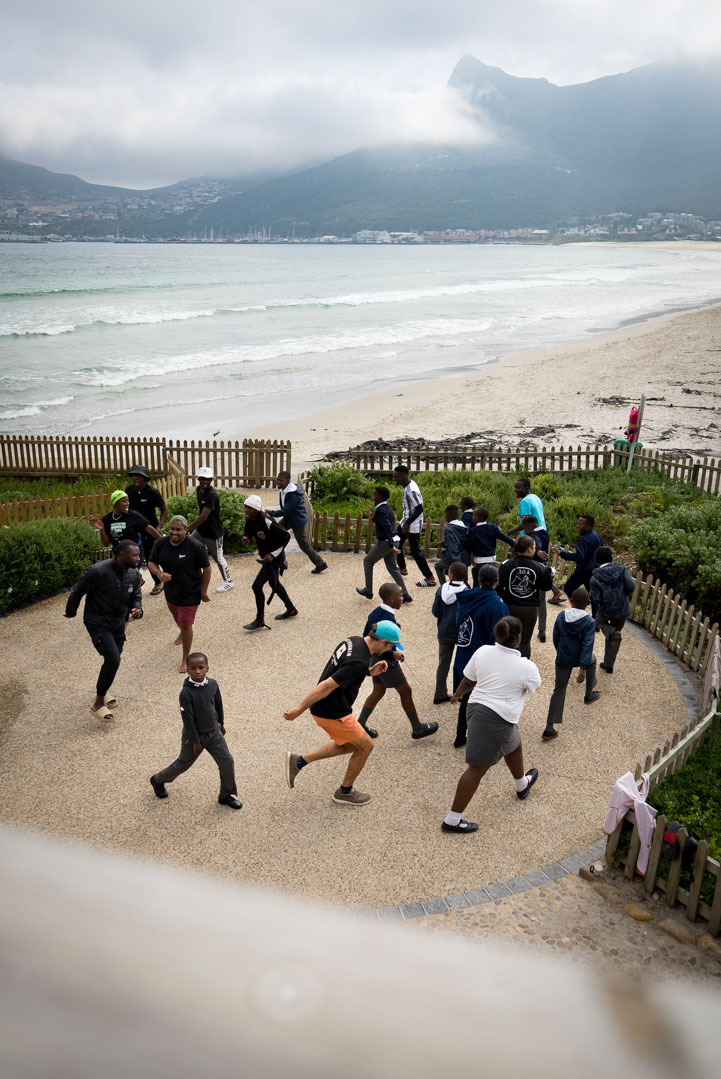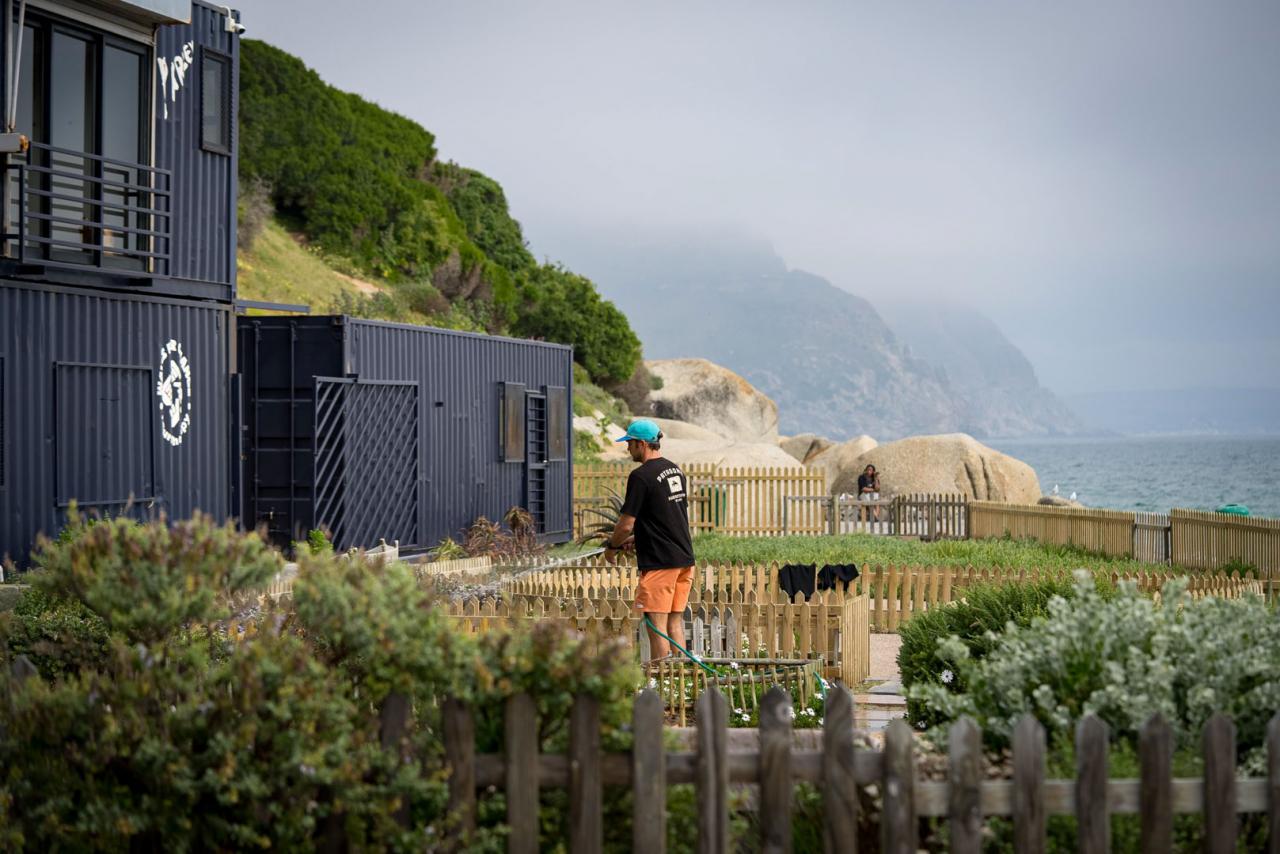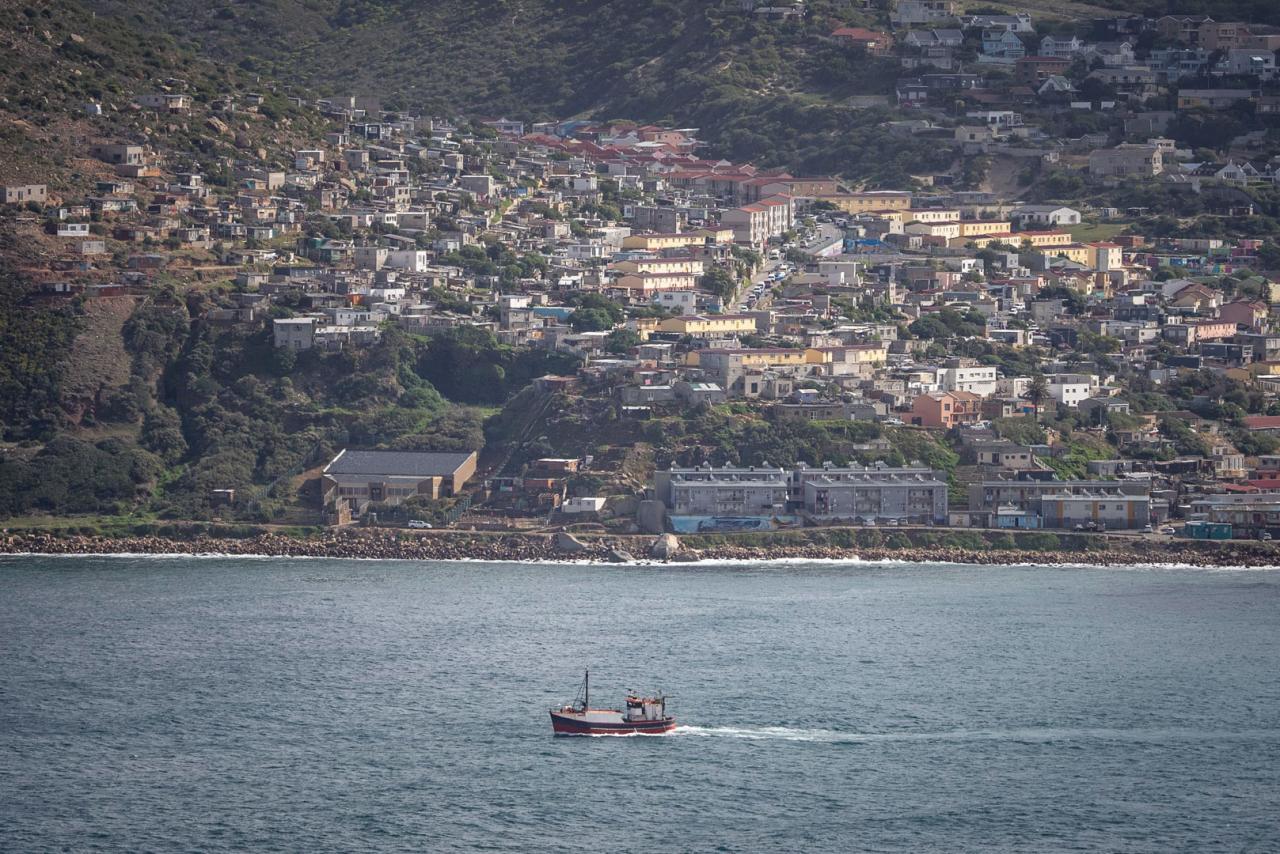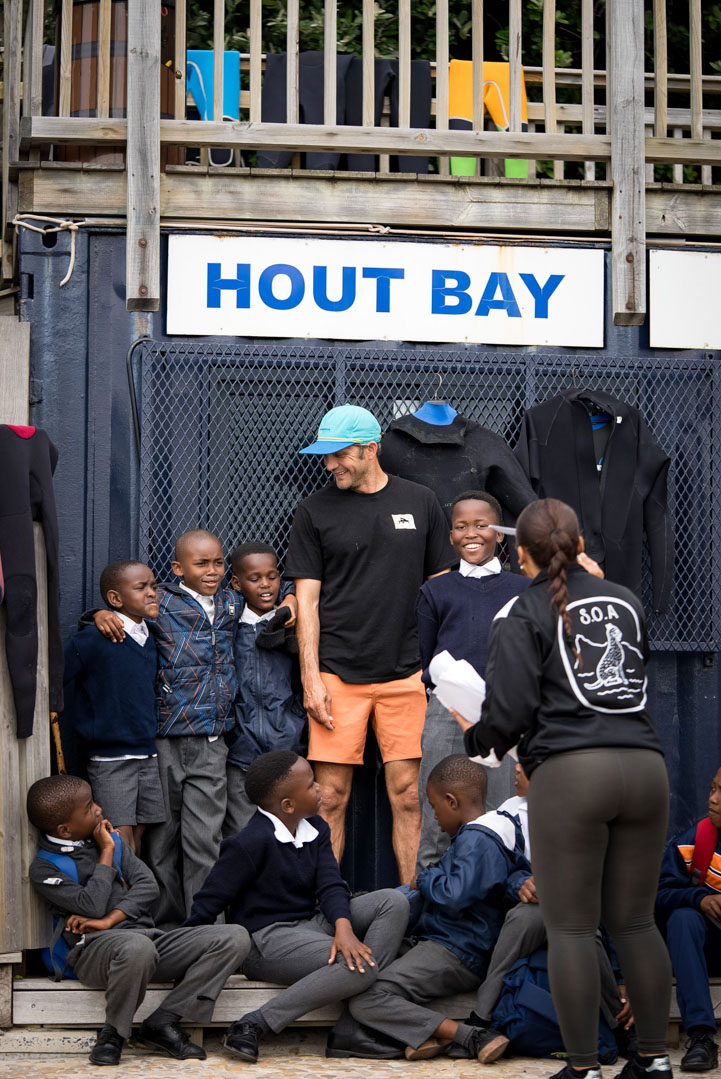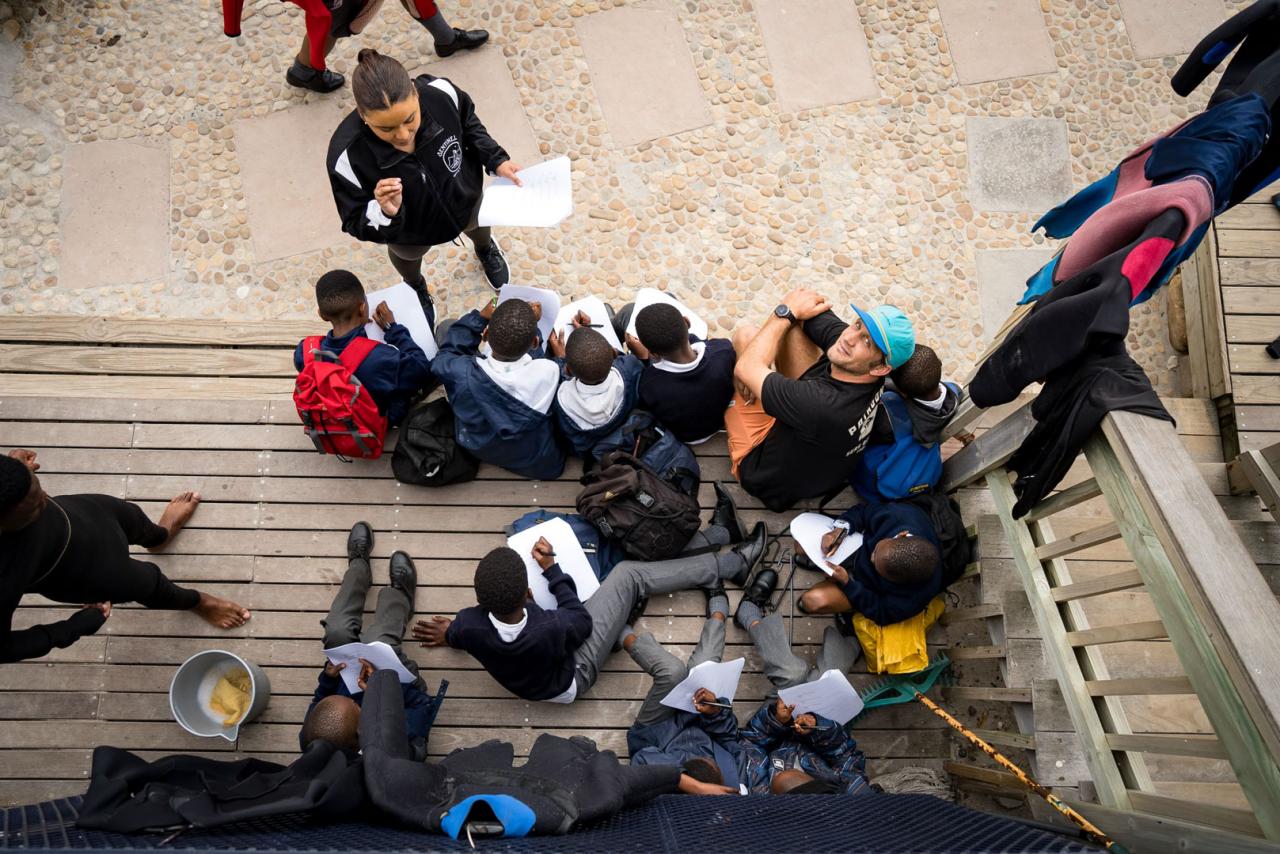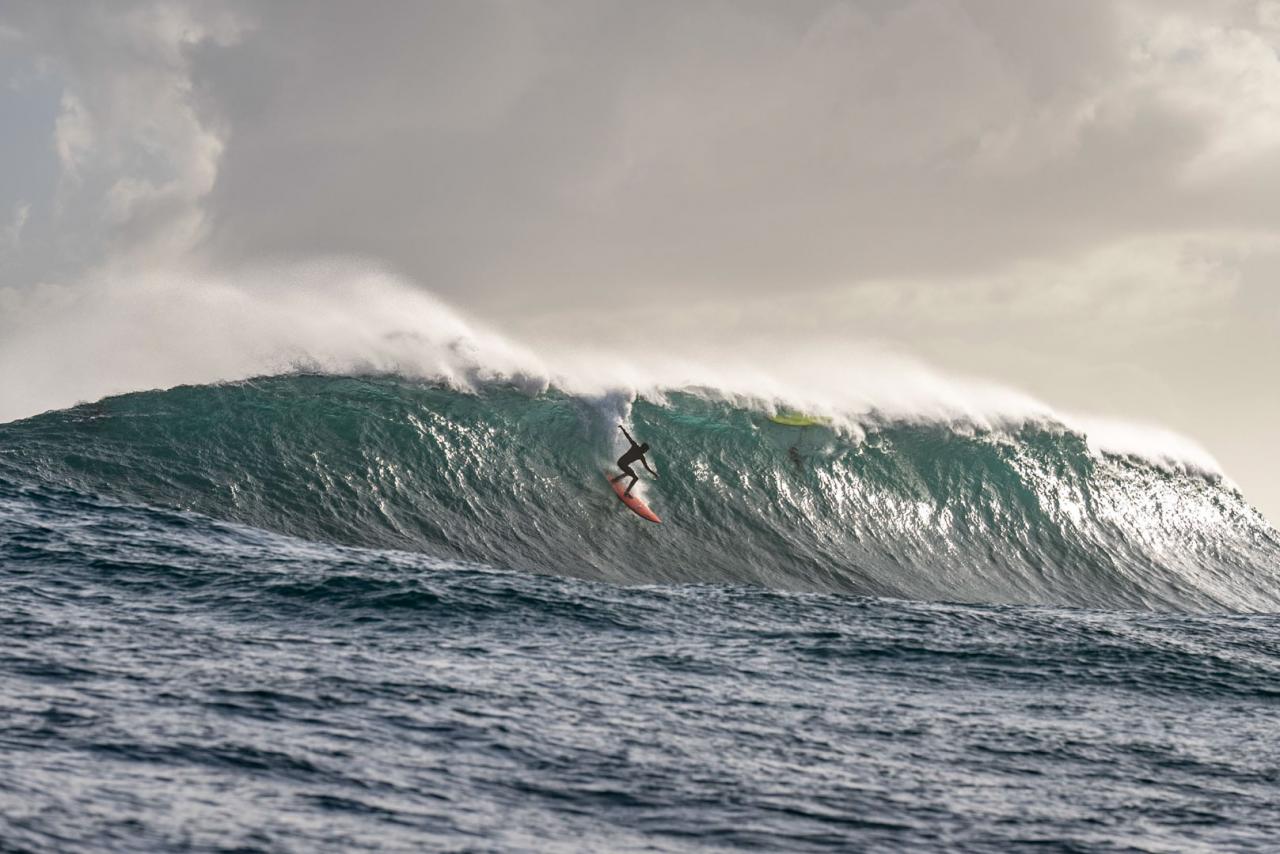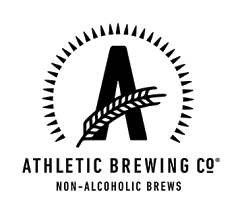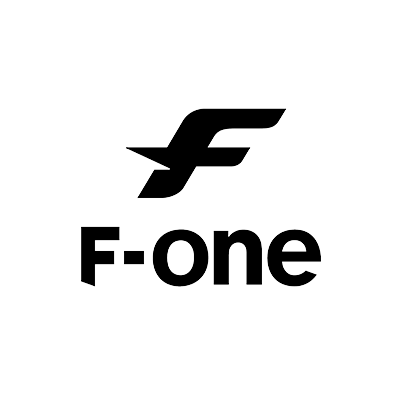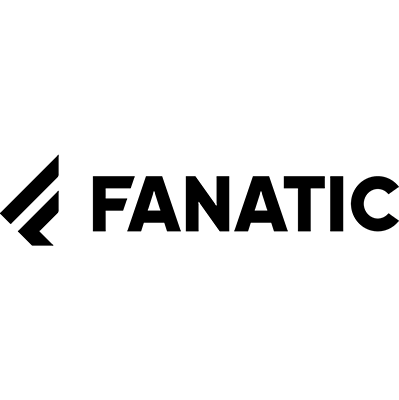Frank Solomon’s entry into the global big wave fold was anything but smooth.
In 1999 Red Bull hosted the first Big Wave Africa (BWA), an invitational surfing event at Dungeons, a world-class reef break at the foot of the Sentinel Mountain near Hout Bay, Cape Town, South Africa, where Frank grew up.
Frank had surfed Dungeons a few times in his late teens with a friend. Following in the footsteps of early surf pioneers by hiking over the mountain, they jumped from the rocks and paddled around a small island with a colony of seals and lurking sharks, though by Frank’s admission only on smaller days and without much success.
But, as fate would have it, the house rented to accommodate most of the international big wave surfers for BWA was next door to Frank’s childhood home.
“I was on my way to school and I wondered what the hell was going on,” he says.
Frank asked the contest directors and surfers, among them Americans Gary Linden and Grant Washburn, whether he could join the pre-event practice sessions. But they refused.
“I could see Sentinel from my balcony and these guys from America were telling me I can't go out and I was like, ‘What do you mean I can't go out? Take me out there, I want to surf’,” Frank recalls.
Undeterred, he decided to go anyway. Emboldened by a phone call with his father Robin, he hiked barefoot over Sentinel Mountain and paddled alone out to Dungeons on his 8’0”.
“I got annihilated,” Frank laughs. “I understand why they didn’t want to take me. They were right. I learned the hard way. I walked back up the mountain and Gary and Grant were there. They were like ‘Are you crazy, what is wrong with you?’ And that is how it started. After that day, they said, ‘If you’re serious, we’ll take you out there. Just don’t do that again!”
Frank blames his stubbornness on his DNA. His great-grandmother Bertha Solomon was one of South Africa’s first female advocates, who helped to pass the Women’s Suffrage Act of 1930. The first woman in parliament, she also campaigned for 27 years to get the Matrimonial Act (also known as ‘Bertha’s Bill’) passed in 1953, which gave women full equal legal rights to men.
Frank’s namesake grandfather and his father Robin have been further significant influences. Frank Solomon Senior was instrumental in the formation of Cape Town’s first lifesaving club and surfing association. Robin is also an accomplished waterman, a pioneering early Cape Town diver, lifeguard and surfer, who opened the city’s first shop in the early 1960s.
Robin became aware of his son’s fearless attitude to big waves when he paddled out on a dare from a fellow lifeguard in 12-foot beach break surf, aged 15. He believes it’s this can-do approach, passed down through the generations, that has forged Frank’s gritty tenacity. “Bertha was unbelievably tough,” he says. “It runs in the family.”
“Then came the famous phone call,” adds Robin. “I said, ‘Tell them to f… off’, and he walked over the hill.”
Part 2 - Frank Solomon: Travelling Big Wave Pro
Frank admits that his ambition to become a big wave professional ebbed when he graduated high school. He took a gap year to backpack through Europe.
“I hardly surfed, never thought about being a pro surfer. I didn’t know what I wanted to study or what I wanted to do,” he says.
His aspiration was reignited in 2000 when he watched fellow South African Shaun Holmes win BWA in 20-foot waves.
“I thought, ‘I can do that’,” he says. “I have been surfing here for longer than most of them.”
Frank started studying construction management. Between classes, he worked his way up the pecking order at Cape Town’s big wave breaks, including Dungeons, where he eventually earned a spot as a BWA alternate and was later allocated a slot in the starting line-up.
But Dungeons is a fickle wave. The conditions rarely align to provide the clean, consistent big surf required for BWA and the event did not run for another six years. Nevertheless, charging hard during the free surf sessions, Frank had proven his bona fides and won the ‘Raw Courage’ award for a spectacular slam in 2006.
Once he graduated from university at the age of 26, Frank dedicated himself to succeeding in the big wave surfing world. Invited by Grant Washburn to stay with him in his home in San Francisco, in 2007 Frank set his sights on Mavericks in Northern California. It was a decision that would repeatedly test his resolve.
A massive swell hit the California coast the day he arrived and Grant was not there to greet him at the airport.
“I didn’t know anyone, didn’t have enough money for a taxi, and ended up staying in a backpackers in the Tenderloin, a pretty rough part of town,” says Frank.
He called his mom in despair, who told him to come straight home. But he opted to give it one more day. Frank eventually got hold of Grant, though he had no space for him and he had to crash at another house.
“I remember that first night, thinking ‘Oh God, what am I doing?’. I don’t know what made me go and do that. I guess I was just determined to be a pro surfer.”
That year Frank barely caught any waves at Mavericks, but he didn’t give up. The following year he was joined by a few more South Africans, snagged a couple of better waves, got some media coverage, and then watched compatriot Chris Bertish win the Mavericks Invitational Surf Contest in early 2010, which refreshed his inspiration.
But as the seasons in California wore on without much further success, couch surfing and eternally broke, Frank began to second-guess his choices.
“Every year, I thought this would be the last year; I'm going to go home and get a job,” he admits “But then I would get some recognition or a photo in a mag and I’d keep going.”
Frank’s first big break came when he was selected as an alternate for the Quiksilver Ceremonial big wave contest at Punta De Lobos in Chile in 2011. Despite surfing on a borrowed board with jetlag, Frank got into the event and caught a wave that changed his life: a gigantic left wall that blacked out the horizon before unloading down the point.
“Pete Mel was screaming for me to go,” he recalls. “I made a huge airdrop, made the heat and made the semis.”
Matching this result in another big wave comp in Peru, Frank finished the year 10th on the big wave world tour, got his first cover of local surfing magazine Zigzag and was sponsored by Hurley South Africa. He spent the next couple of northern hemi winters surfing in Mexico, Northern California and Hawaii with good pal, Josh Redman.
But with only a few events a year and fierce competition for invites, Frank began to slide down the rankings. He resorted to selling Christmas trees, picking pineapples and working construction.
“We had no money,” says Frank. “We were sleeping on the floor in board bags.”
Sidelined by a broken back in 2014, he knew Frank needed to do something drastic to get his momentum going again and travelled to Ireland in 2015, where he caught a slabbing left barrel at Mullaghmore that earned him the Monster Pitstop Tube of the Year at home and an XXL nomination in 2016.
Frank also starred in the eclectic surf film Let’s Be Frank, narrated by Frank's good friend, John John Florence. Loosely based on Frank’s double life as a popular big wave pro and dirt-poor traveller, the film won Surfer Magazine’s Movie of the Year award and an Emmy Award nomination.
It may have seemed like Frank had finally made it. But now in his mid-30s, he was again wondering what the future held.
“I’d been living a life that I was incredibly grateful for, but it also seemed a bit empty,” says Frank, who lost his sponsorship with Hurley shortly afterwards, leaving him adrift. His crisis of confidence coincided with another life-changing moment when he saw a video of a young child shot in the face with a rubber bullet during a political protest in his hometown.
“This was near the same beach where my friends and I spent our youth surfing. I realised I couldn’t be indifferent to the stark South African reality any longer. I knew that I had to use my position of privilege and all my connections to help create access for others to some of the opportunities I had growing up.”
Part 3 - Social Entrepreneur and Family Man
Frank’s idea was to form a social upliftment program driven by surfing and lifesaving. But he had no clue how to go about it. He identified a container on a small lot of unused land in the corner of Hout Bay Beach as the ideal place for his as-yet-unnamed social project.
“The site was full of rubbish, and the container was broken down and being used by vagrants,” he says. “The location was perfect and I knew if I could create a space that the community would buy into we would have the start of something meaningful. But I had no idea how to start.”
Just like his big wave career, with little more than a vague ambition, establishing his new venture was to test Frank’s mettle. In 2018, after navigating miles of red tape and several setbacks in obtaining official permission, Frank formed Sentinel Ocean Alliance (SOA), with the now-renovated container as its headquarters.
“I spent every day at the site, picking up rubbish, planting an indigenous garden, painting, repairing and securing the container,” says Frank. “I could see the potential of what we could create there, and just needed other people to start seeing it.”
Though he battled with local support and funding, Frank obtained backing from Parley for the Oceans, and established an ocean education program for marginalised local youth, a surf school and a lifesaving club, which now has scores of members, employs several permanent staff and has trained dozens more to become qualified lifeguards.
Besides the lifesaving club, which plays a crucial role in ocean awareness and preventing drownings at Hout Bay Beach, SOA’s education programme focuses on reconnecting these ‘township’ kids – most of whom suffer numerous social hardships – with nature. The aim is to foster a sense of well-being, environmental consciousness and responsibility towards the ocean environment.
Through its ‘Turn the Tide’ programme SOA’s education programme focuses on a combination of structured learning modules, ocean immersion and ocean therapy, guest speakers and activities like tidal pool explorations and beach cleanups.
SOA has since taught hundreds of local children to swim, almost 800 kids have graduated from its Immersive Parley Ocean School programme and it has presented more than 500 Turn the Tide sessions. SOA has also provided just short of 18,000 healthy meals for its students and intercepted more than 7,000 kilograms of plastic waste.
“I’m humbled each day by watching these young kids who face so much adversity in their daily lives arrive here,” says Frank, “and to witness the raw exhilaration of them catching a wave or diving below the water for the first time. We’ve had 5,000 kids come through this year.”
The mayor of Cape Town attended one of their regular beach clean-ups recently and pledged to build a permanent structure to replace the three containers they currently work from. SOA then secured a lease for their land for another ten years from the local authorities. Frank’s five-year goal is now to get the new building up and establish a permanent community centre.
Frank recently travelled to Panama and the Dominican Republic to help set up programmes modelled on Turn The Tides.
“We help other organisations to teach the kids how to swim, get set up and let them take over,” says Frank. “We have an app that tracks attendance, so it is super scalable.”
SOA is also looking at expanding its programs to one or two locations in South Africa. However, he is wary of over-extending himself to the detriment of the flagship operation.
“I don’t want to open too many, " he says, reciting the parable of the Portuguese fisherman who would rather enjoy the simple life than run a fleet of fishing boats. “I am just trying to contain it to here and maybe some remote places. I already have so much to deal with. I value my time more than a paycheck I guess, to just be able to go for a surf when the swell is up.”
Frank recently picked up a sponsorship from Patagonia, who also helped to fund SOA. Again, this is a testament to Frank’s persistence, as it took several visits to the US over the years to convince the brand to take him on board. In the end, they could no longer tell him no.
“I went there so many times,” he says. “ I knew that it would be a great fit, to sort out the kids with wetsuits, it was just a no-brainer, but it was difficult to pitch something from South Africa, in a video or an email to people overseas. I had to go in person.”
Now 40, Frank’s success finally means he can stop second-guessing his life choices. He sees himself charging big waves for at least another decade. Frank still travels frequently and remains a standout at Dungeons whenever it breaks. He also wants to catch that elusive bomb at Mavericks someday.
But a few years back Frank married his partner Adele and also recently became proud father of a son, Sebastian, which he says has changed his perspective completely. His aim is now to balance his career with running SOA and his personal life, buy a home and put down roots.
“I am stoked where I am. I am stoked that I got to make a career out of surfing and I am now doing both, it is a cool transition” he says. “I don’t want to be in a position where I still have to ride the biggest waves to make something of myself, I want to separate myself from that. I don’t want to be sitting at Mavericks and missing my son. My dad was such a big part of my life and I want to be there for my son too.”
The team at SOA is also now part of Frank’s extended family, for whom he also clearly cares deeply and feels responsible.
“Some of these guys work here to support their kids, which has more meaning to me than surfing,” he says, “When people said to me ‘You can’t do this’, I said, “Well, I am just going to start’. I’ve learned that even though something can look so daunting that you don’t even want to attempt it, you just have to go for it.”

